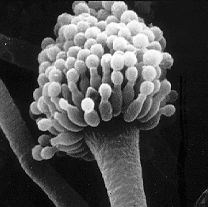Fungi imperfecti
(Redirected from Deuteromycota)
Fungi imperfecti
Fungi imperfecti, also known as Deuteromycota, is a fungal classification that includes species for which no sexual reproduction stage has been observed. This group is not a formal taxonomic group but rather a collection of fungi that reproduce asexually through conidia or spores. The term "imperfect" refers to the absence of a known sexual stage in their life cycle.
Characteristics[edit | edit source]
Fungi imperfecti are characterized by their asexual reproduction. They produce conidia, which are asexual spores that are often formed at the tips of specialized hyphae called conidiophores. These fungi can be found in various environments, including soil, water, and as parasites on plants and animals.
Classification[edit | edit source]
The classification of Fungi imperfecti is based on their asexual reproductive structures and methods. They are often classified into several groups, including:
- Hyphomycetes: Fungi that produce conidia on exposed conidiophores.
- Coelomycetes: Fungi that produce conidia in enclosed structures called pycnidia or acervuli.
Importance[edit | edit source]
Fungi imperfecti play significant roles in various ecological and economic contexts. Some species are important pathogens of plants, causing diseases such as powdery mildew and leaf spot. Others are beneficial and used in the production of antibiotics, enzymes, and organic acids.
Examples[edit | edit source]
Some well-known examples of Fungi imperfecti include:
- Penicillium: A genus of fungi used in the production of the antibiotic penicillin.
- Aspergillus: A genus that includes species used in the production of citric acid and fermentation processes.
- Alternaria: A genus that includes plant pathogens causing leaf spots and other diseases.
Research and Identification[edit | edit source]
The identification of Fungi imperfecti is primarily based on the morphology of their asexual reproductive structures. Advances in molecular biology and genetic sequencing have allowed for more accurate classification and understanding of these fungi, often revealing their relationships to other fungal groups with known sexual stages.
See also[edit | edit source]
References[edit | edit source]
Search WikiMD
Ad.Tired of being Overweight? Try W8MD's physician weight loss program.
Semaglutide (Ozempic / Wegovy and Tirzepatide (Mounjaro / Zepbound) available.
Advertise on WikiMD
|
WikiMD's Wellness Encyclopedia |
| Let Food Be Thy Medicine Medicine Thy Food - Hippocrates |
Translate this page: - East Asian
中文,
日本,
한국어,
South Asian
हिन्दी,
தமிழ்,
తెలుగు,
Urdu,
ಕನ್ನಡ,
Southeast Asian
Indonesian,
Vietnamese,
Thai,
မြန်မာဘာသာ,
বাংলা
European
español,
Deutsch,
français,
Greek,
português do Brasil,
polski,
română,
русский,
Nederlands,
norsk,
svenska,
suomi,
Italian
Middle Eastern & African
عربى,
Turkish,
Persian,
Hebrew,
Afrikaans,
isiZulu,
Kiswahili,
Other
Bulgarian,
Hungarian,
Czech,
Swedish,
മലയാളം,
मराठी,
ਪੰਜਾਬੀ,
ગુજરાતી,
Portuguese,
Ukrainian
Medical Disclaimer: WikiMD is not a substitute for professional medical advice. The information on WikiMD is provided as an information resource only, may be incorrect, outdated or misleading, and is not to be used or relied on for any diagnostic or treatment purposes. Please consult your health care provider before making any healthcare decisions or for guidance about a specific medical condition. WikiMD expressly disclaims responsibility, and shall have no liability, for any damages, loss, injury, or liability whatsoever suffered as a result of your reliance on the information contained in this site. By visiting this site you agree to the foregoing terms and conditions, which may from time to time be changed or supplemented by WikiMD. If you do not agree to the foregoing terms and conditions, you should not enter or use this site. See full disclaimer.
Credits:Most images are courtesy of Wikimedia commons, and templates, categories Wikipedia, licensed under CC BY SA or similar.
Contributors: Prab R. Tumpati, MD

